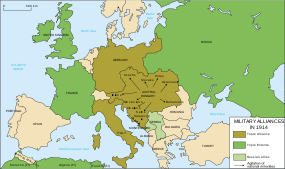
Spain in World War I
Encyclopedia

Spain
Spain , officially the Kingdom of Spain languages]] under the European Charter for Regional or Minority Languages. In each of these, Spain's official name is as follows:;;;;;;), is a country and member state of the European Union located in southwestern Europe on the Iberian Peninsula...
remained neutral throughout World War I
World War I
World War I , which was predominantly called the World War or the Great War from its occurrence until 1939, and the First World War or World War I thereafter, was a major war centred in Europe that began on 28 July 1914 and lasted until 11 November 1918...
between 28 July 1914 – 11 November 1918, but despite domestic economic difficulties, it was considered "one of the most important neutral countries in Europe by 1915". Spain
Spain
Spain , officially the Kingdom of Spain languages]] under the European Charter for Regional or Minority Languages. In each of these, Spain's official name is as follows:;;;;;;), is a country and member state of the European Union located in southwestern Europe on the Iberian Peninsula...
had enjoyed neutrality during the political difficulties
Causes of World War I
The causes of World War I, which began in central Europe in July 1914, included many intertwined factors, such as the conflicts and hostility of the four decades leading up to the war. Militarism, alliances, imperialism, and nationalism played major roles in the conflict as well...
of pre-war Europe
Europe
Europe is, by convention, one of the world's seven continents. Comprising the westernmost peninsula of Eurasia, Europe is generally 'divided' from Asia to its east by the watershed divides of the Ural and Caucasus Mountains, the Ural River, the Caspian and Black Seas, and the waterways connecting...
, and would continue its neutrality after the war until the Spanish Civil War
Spanish Civil War
The Spanish Civil WarAlso known as The Crusade among Nationalists, the Fourth Carlist War among Carlists, and The Rebellion or Uprising among Republicans. was a major conflict fought in Spain from 17 July 1936 to 1 April 1939...
began in 1936. While there was no direct military involvement in the war, German
German Empire
The German Empire refers to Germany during the "Second Reich" period from the unification of Germany and proclamation of Wilhelm I as German Emperor on 18 January 1871, to 1918, when it became a federal republic after defeat in World War I and the abdication of the Emperor, Wilhelm II.The German...
forces were interned in Spanish Guinea
Spanish Guinea
Spanish Guinea was an African colony of Spain that became the independent nation of Equatorial Guinea.-History:The Portuguese explorer, Fernão do Pó, seeking a route to India, is credited with having discovered the island of Bioko in 1472. He called it Formosa , but it quickly took on the name of...
in late 1915, and Spain undertook efforts to aid prisoners of war during the conflict under Alfonso XIII, then King of Spain. Such efforts were matched by protests of Germany's U-boat
U-boat
U-boat is the anglicized version of the German word U-Boot , itself an abbreviation of Unterseeboot , and refers to military submarines operated by Germany, particularly in World War I and World War II...
use; Spain lost 140,000 tonnes of shipping to German submarine
Submarine
A submarine is a watercraft capable of independent operation below the surface of the water. It differs from a submersible, which has more limited underwater capability...
s.
See also
- Participants in World War IParticipants in World War IThis is a list of countries that participated in World War I, sorted by alphabetical order.-The Entente Forces:Note: The Entente Forces are sometimes also referred to as the Entente Powers or Allies of World War I....
- Spain in World War IISpain in World War IIThe Spanish State under General Franco was officially non-belligerent during World War II. This status, although not recognised by international law, was intended to express the regime's sympathy and material support for the Axis Powers, to which Spain offered considerable material, economic, and...
- Allies of World War IAllies of World War IThe Entente Powers were the countries at war with the Central Powers during World War I. The members of the Triple Entente were the United Kingdom, France, and the Russian Empire; Italy entered the war on their side in 1915...
- Triple EntenteTriple EntenteThe Triple Entente was the name given to the alliance among Britain, France and Russia after the signing of the Anglo-Russian Entente in 1907....
- Triple AllianceTriple AllianceTriple Alliance may refer to:* Aztec Triple Alliance - Tenochtitlan, Texcoco and Tlacopan; better known as the Aztec Empire* Triple Alliance - England, France and the Dutch Republic...
- Central PowersCentral PowersThe Central Powers were one of the two warring factions in World War I , composed of the German Empire, the Austro-Hungarian Empire, the Ottoman Empire, and the Kingdom of Bulgaria...

